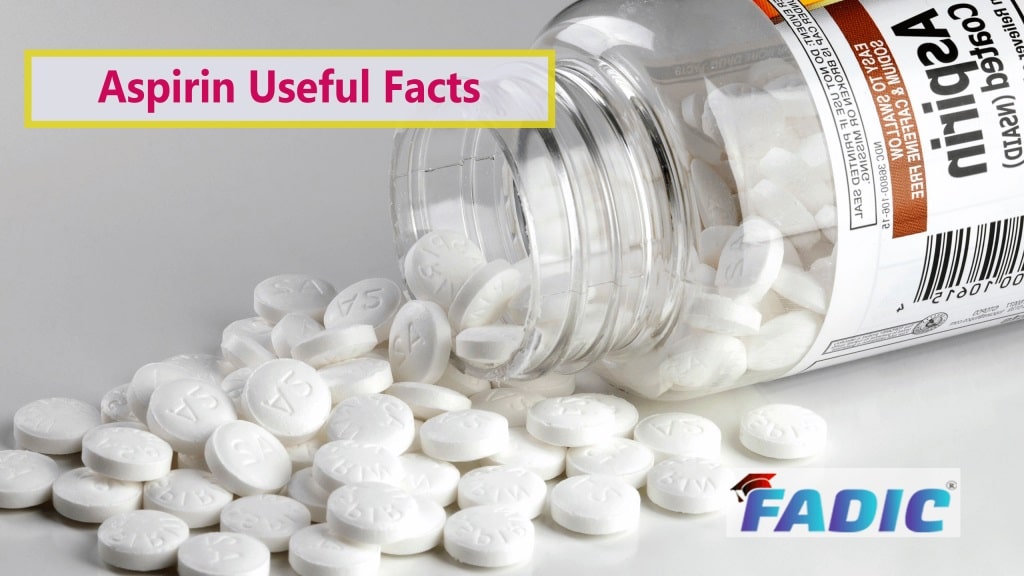5 Useful Facts About Aspirin

There are 5 Useful Facts About Aspirin, as an acetylated salicylate (acetylsalicylic acid). It is classified among the non-steroidal anti-inflammatory drugs (NSAIDs).
1- What is Aspirin?
- Aspirin, as an acetylated salicylate (acetylsalicylic acid). It is classified among the non-steroidal anti-inflammatory drugs (NSAIDs). It reduces the signs and symptoms of inflammation and exhibits a broad range of pharmacological activities, including analgesic, antipyretic. In addition to antiplatelet properties.

2- The mechanism of action of Aspirin as antiplatelet:
- It induces a permanent functional defect in platelets. It has a prolonged bleeding time. This appears to be primarily, if not exclusively. It has irreversible inactivation of a key enzyme in platelet arachidonate metabolism through acetylation of a critical serine residue near its catalytic site.

3- Aspirin Dosage:
- The Aspirin’s effects and respective mechanisms of action vary with dose:
- Low doses (typically 75 to 81 mg/day) are sufficient to irreversibly acetylate serine 530 of cyclooxygenase (COX)-1. This effect inhibits platelet generation of thromboxane A2, resulting in an antithrombotic effect.
- Intermediate doses (650 mg to 4 g/day) inhibit COX-1 and COX-2, blocking prostaglandin (PG) production. Moreover, it has analgesic and antipyretic effects.
- High doses (between 4 and 8 g/day) are effective as anti-inflammatory agents in rheumatic disorders. The mechanism(s) of action at these high doses may include both PG-dependent (particularly COX-2-dependent PGE2) and independent effects. However, the usefulness of aspirin at these high doses is limited by toxicity, including tinnitus, hearing loss, and gastric intolerance.
4– Aspirin COX inhibition:
- The COX inhibition of Aspirin is central to the mechanism of action of both aspirin and the salicylate nonsteroidal anti-inflammatory drugs (NSAIDs). In addition to, other proposed mechanisms of action COX inhibition does not explain all the anti-inflammatory effects of aspirin and related drugs, nor does COX inhibition address the diverse effects of PGs on cells.
As examples:
- Although aspirin blocks PG synthesis via COX inhibition, stable PGs and their analogs are in fact antiinflammatory.
- Sodium salicylate, a nonacetylated salicylate, is an ineffective COX inhibitor but is as potent as aspirin in its anti-inflammatory effects.
- Higher doses of aspirin and other NSAIDs are required to exert anti-inflammatory effects than doses sufficient to markedly inhibit synthesis of PGs PG-independent actions of aspirin and other salicylates include:
- Inhibition of neutrophil activation and responses, including the response to soluble stimuli such as leukotrienes and complement-derived peptides. The synthesis of leukotrienes, superoxide generation, enzyme release, and aggregation and adhesion.
- Inhibition of the expression of inducible nitric oxide synthase (iNOS) through COX-independent mechanisms. Thus it causes inhibition of the generation of nitric oxide, which is important in inflammation, host-defense responses, and tissue repair. While aspirin does not completely inhibit iNOS expression at therapeutic concentrations, partial suppression may be sufficient to inhibit an inflammatory response.
- Inhibition of the activation of nuclear factor (NF)-kappa B, a transcription factor that participates in the inducible expression of multiple cellular and viral gene products involved in inflammation and infection. In addition to, it includes the interleukin (IL)-1, IL-6, tumor necrosis factor (TNF), and adhesion molecule.
- Inhibition of Erk kinase activation, which is important in CD11b/CD18 integrin-dependent adhesiveness of human neutrophils, a critical step in inflammation.
5- Side Effects of Aspirin:
- One of the most common side effects of Aspirin is Upset stomach and heartburn that may occur, and prompt the referral for healthcare professionals.
- There are Useful Facts About Aspirin, are the most important uses and dosage of Aspirin.
Read More:
- Antimicrobial Stewardship School
- Sepsis Training Program
- Download Pocket Guide for Antibiotic Pharmacotherapy Book
- Microbiology Course | ABC Bacteria
- Infectious Disease E-News | FREE Subscription
- ABC antimicrobials | Know all about the Antimicrobials
- Road Map to Antimicrobial Stewardship Training Program
- Register Now in FADIC Clinical Research School
- FADIC Drug Information Fellowship
- Buy FADIC Toolkit for Writing Research to Write a Great Research Paper
- Read 10 Skills You Must Learn to Make a Research via Google Scholar in Arabic
- The FADIC Online Continuous Medical Improvement Programs & Mini-Courses.
- Check Now FADIC Book store and Buy books in different specialties.
- Watch Now FADIC TV to Keep your self Updated.
- FADIC Podcast focusing on varieties of pharmacist perspectives in different specialties.
- Subscribe Now in FADIC 2020 Daily News (FNN) and Keep Updated.
- Check Now about Coronavirus Resource Information Center.

 Log in
Log in Sign up
Sign up